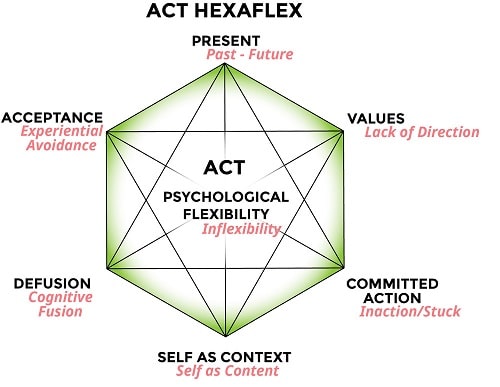Acceptance and Commitment Therapy (ACT) is a kind of psychotherapy that encourages you to acknowledge the troubles that come in life. ACT is especially useful for taking care of depression feelings since it offers individuals an approach to building up an alternative relationship with agony and suffering. An essential aspect of ACT is that pain is a typical and unavoidable part of human experience. It bodes well that individuals have compelling feelings within sight of painful encounters. Be that as it may, individuals' justifiable want to control or evade their thoughts and emotions can prompt a lot of long hauls and pointless suffering. For instance, an individual may grow short-term methods for adapting to their feelings–such as social withdrawal, substance use, or binge-eating – that cause greater pain in the future. More regrettable yet, time spent battling with thoughts and emotions is time away from the things that matter most in life. Set forth plainly, ACT for Depression is tied in with relinquishing the battle with troublesome thoughts and emotions to seek after a more extravagant, fuller, and purposeful life.
What is Depression?
Depression can show itself in various structures and affect individuals' lives in a huge number of ways. It's unique concerning feeling pitiful once in a while, or even grief-stricken in the face of loss. For certain individuals, side effects of depression can get crippling to the point of risking their connections, professions, or even their own lives. The paradox of depression concerns the practices frequently connected with depression, for example, avoiding friends and family or activities that were once pleasurable, which by and large serve to keep up or even intensify the depression itself. Luckily, it is conceivable to end this harmful cycle and ensure a definite treatment for depression, slowly and carefully.

It is imperative to perceive that awkward interior states, for example, dread and uneasiness, are not naturally "awful" or "wrong." Indeed, similarly, fear and tension can serve important capacities and provide crucial information with every enthusiastic experience. Concerning ACT for Depression, according to Dr Robert Zettle, anxiety becomes risky with conscious endeavors to evade, direct, or in different ways, control its experience. Within the setting of Acceptance and Commitment Therapy (ACT), this cycle is alluded to as experiential avoidance.
What is Acceptance and Commitment Therapy?
Acceptance and Commitment Therapy(ACT) is a type of Cognitive Behavioral Therapy (CBT) that has accumulated a great deal of proof for its adequacy for treating depression throughout the last couple of decades. It analyzes the connection between an individual's thoughts, feelings, and behaviors, thereby changing their interaction pattern to deliver more noteworthy life fulfilment. ACT utilizes mindfulness practices to assist individuals with increasing awareness and build up a mentality of acceptance and compassion in the presence of painful thoughts and emotions. Moreover, ACT vigorously stresses the part of qualities to assist individuals with making important lives. ACT helps individuals with dodging unhelpful intuition in those situations of life where it is less useful – where the psyche may have created limited guidelines – and it assists individuals with reinforcing parts of reasoning where it will generally be useful for example, in resolving to esteemed living.

How does ACT work?
ACT centres around three areas:
- Acknowledge your responses and be available.
- Pick a valued direction.
- Make a move.
Acceptance
Regardless of whether it be a circumstance you can't control, a character attribute that is difficult to change, or a feeling that overpowers, tolerating it can permit you to push ahead. Fixating, stressing, and playing things, again and again, keep you stuck. In this sense, inquiring as to for what reason can leave you defenseless. ACT welcomes you to acknowledge the truth and work with what you have.
Some acceptance systems include:
- Letting feelings or emotions occur without the motivation to follow up on them.
- Watch your shortcomings; however, observe your qualities.
- Allow yourself to not be acceptable at everything.
- Recognize the trouble in your existence without getting away from it or evading it.
- Understand that you can be in charge of how you respond, think, and feel.
Defusion
Another part of ACT is the range of abilities to figure out how to defuse psychologically heightened experiences intellectually. Defusion includes acknowledging feelings and thoughts for what they truly are, such as passing sensations or irrational things that we let ourselves believe in - rather than what we might suspect they resemble emotions that will never cease to exist or factual truths. However, the objective of defusion isn't to assist you with maintaining a strategic distance from the experience to make it more sensible for you.
Some defusion procedures include:
- See what you are feeling. What are the physical sensations?
- Notice how you are conversing with yourself as these feelings are experienced.
- What interpretations would you say you are making about your experience? It is safe to say that they are situated as a general rule?
- Take hold of the strands of your negative self-talk and counter them with reasonable ones.
- Presently reconsider your involvement in your newly discovered viewpoint.
How can you combat depression with ACT?
Acceptance and Commitment Therapy for Depression is not a long-term treatment. Here are some ways to rework your painful thoughts and emotions and work up your way towards a more meaningful life.
Self-Compassion and Healing
You can settle on decisions at this time that will influence the probability of a more important and pleasant future. Attempt to effectively practice self-compassion, particularly when making those first little steps towards the chance of a more promising future. It's normal for certain individuals to look at their "depressed selves" to the memory of their "sound selves," which can justifiably prompt setting unreasonable desires… and taking care of into the paradoxical pattern of depression.

This doesn't imply that you are, by one way or another, "not exactly" the best form of yourself – it implies that you are, it might be said, harmed and need time to mend. Suppose you had broken your arm or leg… okay have similar desires for yourself to have the option to take part in ordinary physical action or care for yourself in similar manners? Likely not. Depression is similarly "genuine" as a messed up appendage, even though you aren't wearing a project or highlighting it on an X-Ray. Try keeping this in mind as a means of being benevolent towards yourself as you mend.
Experiential Avoidance versus Acceptance
One approach to counter the impacts of experiential avoidance and start to move your attitude steadily is through the cycle of acceptance. Remember that acceptance doesn't require approval. Or maybe, acceptance encourages the production of new mental and emotional space for inner experiences (i.e., musings, feelings, or vibes) that might be disagreeable or awkward. As it were, this recently discovered space for recently stifled encounters can be an incredible advance towards diminishing pointless anguish. Inside this new space, you will start to have space to start working with your current second conditions similarly as they seem to be… imperfections and everything.
Practice Acceptance and Cognitive Defusion
- Try reading through these strategies for practicing acceptance and psychological defusion. Notice what thoughts impact you as by and by important or feasible:
- Permit thoughts and feelings to occur without the drive to make prompt moves.
- Recognize troubles or battles in your existence without limiting or dodging them.
- Carefully see how you converse with the inner self during troublesome moments.
- Make a stride once more from your interior discourse… ask yourself what proof you need to help any negative self-talk.
Conclusion
If you are currently experiencing depression or have concerns about your emotional well-being in any way, it is important to meet with a qualified mental health professional to collaboratively determine the best potential treatment for your individual needs. If you, or someone close to you, is struggling with or has expressed thoughts of either self-harm or suicide, know that credible mental health coaches are available for your well-being. For more information, visit Swasth and download our DBT Coach, a robust platform to seek help from trained psychotherapists and practice various evidence-based therapy skills at ease.



